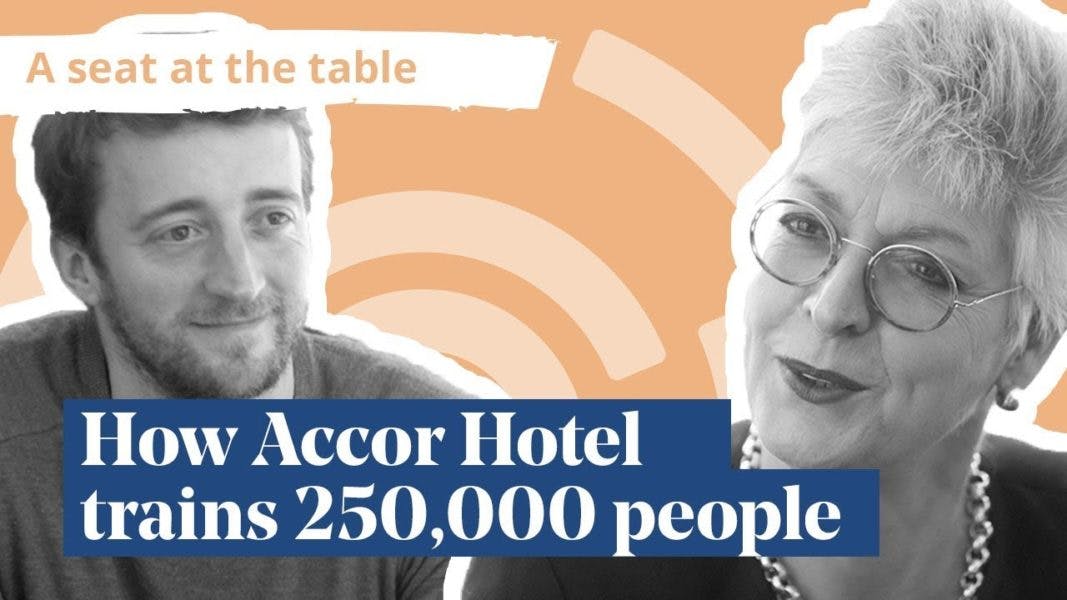A fireside chat with L&D thought leader Caro Van Eekelen, Accor Hotels Global Senior Vice-President of Learning, Development and Transformation.
How to create change in culture and training in a company with 280,000 employees?

Whether you’re in Learning and Development, Business Operations, or any other sector, I won’t teach you anything new by saying we live in a world of great uncertainty.
From seasoned brands to fresh up-and-coming game-changers, every business around the world is dealing with disruption and instability to some degree. Their responses to these disruptions can lead to transformative changes.
That’s why it’s so valuable to listen to thought leaders like Caro Van Eekelen, the first female country COO at Accor Hotels and current Global Senior Vice-President of Learning, Development and Transformation.
We sat with Caro to discuss the organizational changes at work at Accor Hotels and within the brand portfolio including Pullman, Sofitel, Fairmont, and Orient-Express. At each level, Learning and Development executives are paving the way to help the 280,000-employee company grow in an era of major changes.
No time to watch it all? We’ve got a great summary for you.
“With great teams, you can achieve great projects”: How Accor Hotels approaches L&D
“My whole experience is between Human Resources and Operations. What do these areas have in common? People.
I think that with great teams, you can achieve great projects.
Transitioning from Country COO to Global Senior Vice-President of Learning, Development, and Transformation was just the opportunity to have an impact on 250,000 people instead of just the Benelux. Especially in the context of changing expectations both from our guests and from our employees.
The hospitality industry is changing fast, so you have to try and find new ways through this change. At Accor, we have a comprehensive offer of training programs from onboarding to brand and leadership programs.
When I undertook my new position last year, we had roughly 1,500 training programs available. Each country was totally independent with their L&D offer. Which means we had 18 academies. In those academies, one of them was serving 18 hotels, and one that was serving 1,500 hotels.
It shows how each academy worked completely differently, from the way they packaged their offer, to how they marketed it or calculated its impact on business. What we did first was to set up governance.“
Balancing global governance with local initiatives
“We nominated five regional academy heads, once for each region of the group, and we also have stakeholders at a Global level. This team is in charge of co-designing the academy system. All decisions are made collegially.
We are now working on hosting all the training offer on a unique learning platform with mobile features so every member of our teams, from managers to front-of-house staff, can train whenever they want.
Giving universal access to learning is probably the most challenging part today.
For years, some employees have been given the chance to up-skill while others were not given time to train. We are changing that with our new approach.
Measuring the business impact of programs three months after staff took it has been very valuable to build the legitimacy of our actions.“
For Accor Hotels, purpose is everything
“Our overall goal is to make training a way of life at Accor Hotels. Making learning a part of our culture is not only a matter of L&D efficiency. It’s a matter of organizational transformation.
That’s why my scope combines Learning and Development and Transformation. You can’t have digital transformation if you don’t have cultural transformation. And it all starts with people.
You can throw any new digital marketing tool, if you don’t give a purpose to what you’re aiming for, digital transformation will never work.
We started with change. As an organization, we need to change because our guests are changing. They want personalization, so we have to get rid of standardization. Which means we have to free up the people.
Nurturing this entrepreneurship, initiative-taking spirit is key to Accor Hotels’ success in the future.“
Want more insights from top L&D leaders? Check out our series of interviews with L&D leaders on how learning and development should change and strategies to train teams to prepare for the future.


